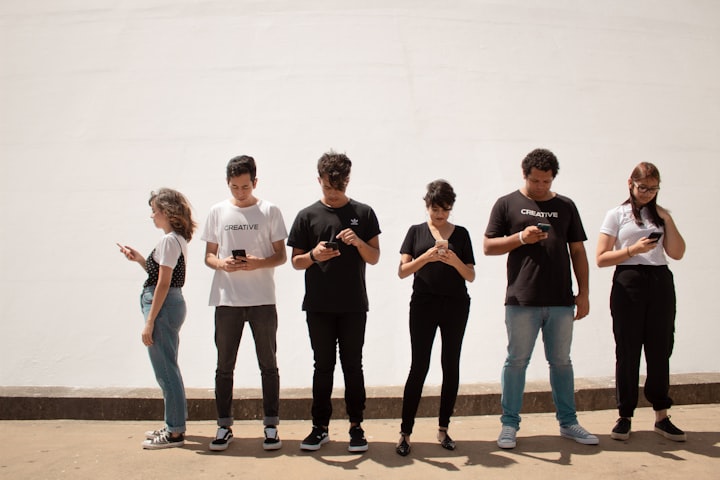The Impact of Social Media on Mental Health
Exploring both positive and negative effect

Social media has become an integral part of our everyday lives in the fast evolving world of technology. Inspiring new relationships and worrisome consequences for people's mental health have emerged from the ubiquitous nature of these platforms. This in-depth investigation seeks to unravel the complex web of connections between social media and psychological health by illuminating the various ways in which these online communities impact our mental states.
An Idealized View of Life: One of the main draws of social media is the way users can curate and showcase an idealized picture of their lives. On the other hand, the perception of flawlessness is frequently maintained by this staged reality. The constant barrage of perfect photos of people's lives, relationships, and bodies on social media makes it hard for many of us to live up to our potential. Anxiety and despair can flourish in an environment where these unrealistic standards are constantly reinforced, which can have a devastating effect on self-esteem.
People may constantly struggle with feelings of inadequacy as they strive for the perfect lives depicted online. An individual's mental health might take a hit when they feel they have no choice but to adapt to these impossible standards, which are spread by both influential people and their peers.
The widespread practice of comparison is fundamental to the negative effect of social media on users' psychological well-being. The constant stream of hand-picked highlights from other people's life encourages users to draw parallels and evaluate them more closely. Envy, inadequacy, and a persistent feeling of not measuring up can be triggered by the endless parade of accomplishments, pleasures, and experiences displayed on these platforms.
A vicious cycle of self-doubt can develop when people are constantly comparing their own lives to the apparently ideal ones of others. The emotional toll of always comparing oneself to others can take many forms, including anxiety, despair, and a deep-seated feeling of inadequacy that permeates both online and offline encounters.
When people use social media, they can hide their identities, which might give them the confidence to intimidate or harass others online. The mental health of individuals can be severely impacted by harmful remarks, messages, and cyberattacks. Anxiety, persistent worry, and, in the worst instances, the worsening of preexisting mental health disorders can result from the emotional discomfort induced by such cyberbullying.
If we want to create a safer space for people to use the internet, we must do something about the epidemic of cyberbullying and put safeguards in place to stop it. If we want to create a digital environment that encourages understanding, empathy, and responsible digital citizenship, we must raise awareness about the effects of cyberbullying on mental health.
One psychological issue that is made worse by social media is the Fear of Missing Out (FOMO). A widespread sensation of missing out (SMO) can set in when members of these networks are inundated with updates about things they aren't a part of. Isolation, loneliness, and an overwhelming need to be connected all the time might be exacerbated by these carefully selected peeks into other people's lives.
In order for people to form healthier online habits, it is vital for them to understand the significance of FOMO in mental health. One important step in reducing the negative impact of FOMO on mental health is learning to distinguish between real wants and the pressure to meet digital standards.
Despite the difficulties, it is critical to acknowledge that social media may also be a strong source of community and support. Online communities provide a safe place for people to talk about mental health, find others who understand, and get the help they need. A more nuanced and balanced view of social media's function in our lives can be achieved by acknowledging its positive effects.
Many online platforms have seen the growth of supportive groups whose primary goal is the promotion of mental health education, advocacy, and awareness. Members of these groups can feel comfortable opening up about their experiences, asking for and receiving support, and gaining access to tools that promote emotional and psychological health. If we want to build a digital space that encourages compassion, understanding, and mutual aid, we must use social media for its positive purposes.
In sum, finding a happy medium between social media and mental health is crucial in this intricate web. It is critical to acknowledge the beneficial contributions of these platforms while also acknowledging the issues they pose, such as the illusion of perfection, comparison culture, cyberbullying, and FOMO. With caution and self-control, the global community brought together by social media has the potential to do tremendous good.
Raising awareness and encouraging appropriate social media use are crucial steps in our quest for a better digital life. Together, we can build resilience and mindfulness in the face of digital challenges by promoting digital literacy, having open dialogues about mental health, and cultivating empathy in online interactions. By working together, we can make the most of social media while reducing the risks to mental health and creating an online community that values happiness.
About the Creator
Shadrach
I'm a blogger that enjoys writing about the power of God, technology, health, pets and online marketing.
Enjoyed the story? Support the Creator.
Subscribe for free to receive all their stories in your feed. You could also pledge your support or give them a one-off tip, letting them know you appreciate their work.





Comments
There are no comments for this story
Be the first to respond and start the conversation.